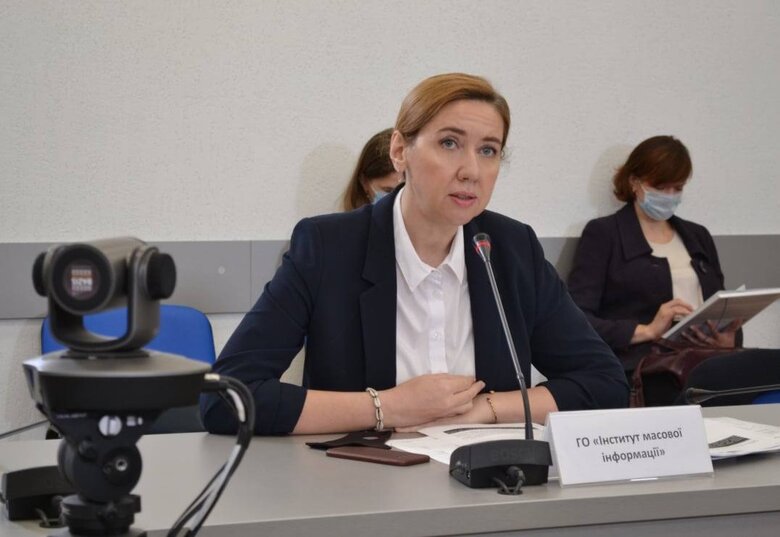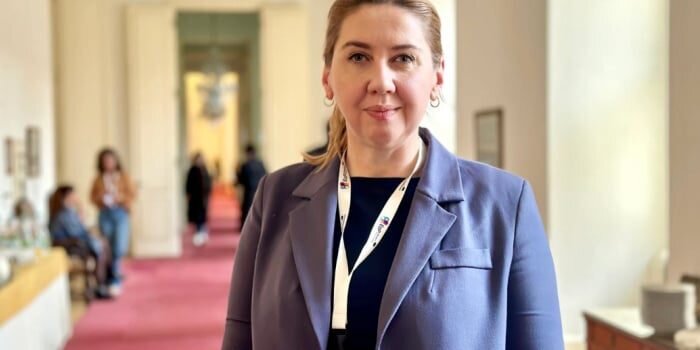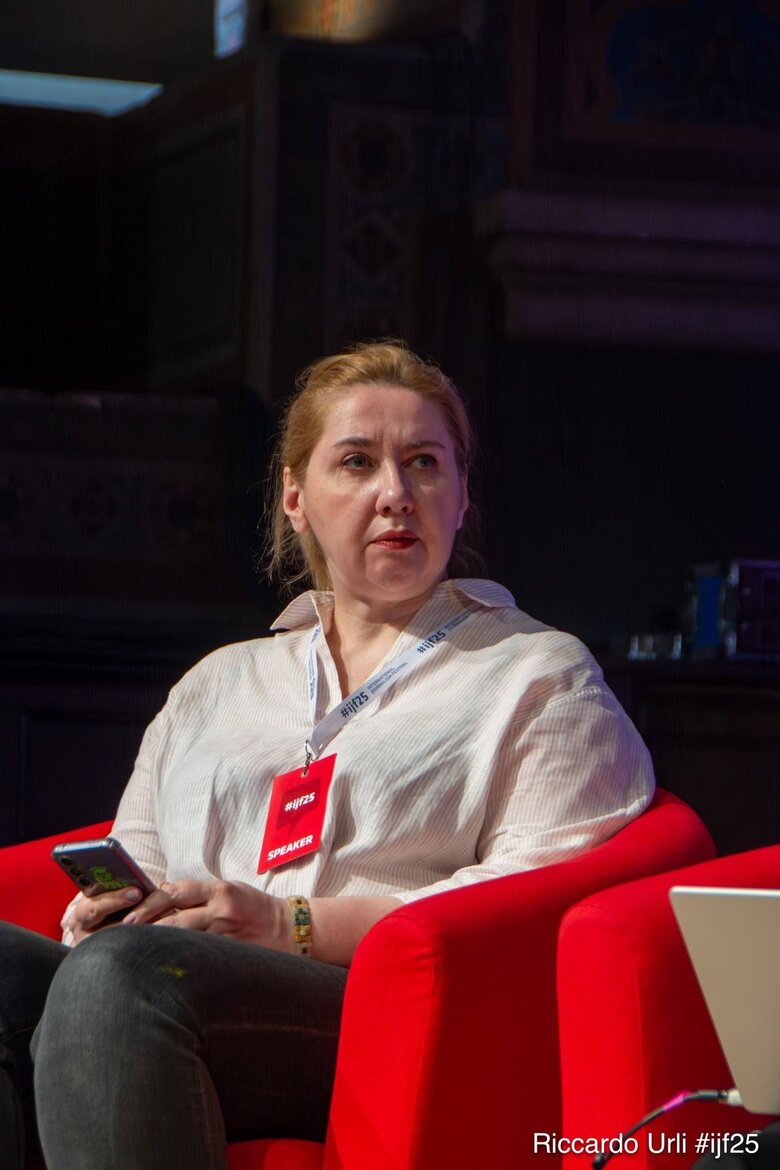IMI Director Oksana Romaniuk: "We recorded cases where not only were drones dropping munitions on journalists, but snipers were also shooting at them"
Much depends on how journalists work during wartime — because information, too, is a weapon in this war, one that the enemy actively exploits. That’s why those who speak the truth to the world become targets.
We spoke with Oksana Romaniuk, Executive Director of the Institute of Mass Information (IMI), about how Russians are hunting down journalists and why media professionals held in captivity are not being returned in prisoner exchanges.
- From the start of the full-scale invasion through mid-March 2025, Russia attacked Ukrainian hotels at least 31 times, injuring no fewer than 25 media professionals. This is according to a study conducted by the journalistic organizations Truth Hounds and Reporters Without Borders (RSF). The authors of the report argue that these attacks do not appear to be random — rather, they point to a deliberate and recurring tactic. Given the findings of this research, can we say that Russians are, in fact, hunting down Ukrainian journalists?
- Absolutely. Our own observations confirm this as well. We have repeatedly documented cases where journalists were not only targeted with munitions dropped from drones, but also were being shot at by snipers. In all these instances, the journalists were "marked", and the enemy knew full well they were members of the media.
As for the hotel strikes, I believe the Russians are fully aware that, from the earliest days of the war, hotels became key hubs for the journalistic community, especially for international reporters. These locations offer access to the internet, allow them to charge equipment and phones, grab a meal, and quickly exchange information with colleagues. I believe this is one of the reasons Russians chose to target them.
Hotels are by no means legitimate military targets. They are inherently civilian facilities. So targeting journalists and shelling hotels constitute a direct violation of international humanitarian law.
- Have you shared all documented incidents involving journalists with law enforcement or international bodies investigating war crimes?
- Yes, we work systematically with Ukrainian law enforcement. We’re part of a working group established under the Office of the Prosecutor General, and we pass on information about such crimes through that channel. Based on this data, criminal proceedings are either opened or details are clarified if the authorities already have some preliminary information.
We also cooperate with international partners, including Reporters Without Borders, who prepared the report on hotel attacks. We were involved in that work as expert contributors. In fact, all international organizations rely on our data. That said, we would like to see more practical results.
- And what is the result now?
- At this stage, what we have is public pressure and a growing awareness among our partners that Russia is indeed committing crimes — and that we need justice. This means we need an international tribunal that can pave the way for holding the perpetrators accountable.
- You mentioned that you cooperate with the Prosecutor General’s Office as part of a working group. Do you know how crimes against media professionals are investigated during the war? Are they being systematized into a single main case file?
- Last year, we began working with them to make this a separate main case file. The goal is to align Ukrainian legislation with European legal standards and the case law of the European Court of Human Rights. Right now, our legislation defines a "journalist" in very narrow terms — as someone who holds editorial credentials and is engaged in gathering and disseminating information. However, under international law, the term also includes producers, bloggers, photographers, camera operators, freelancers, commentators, editors, and presenters. So we need to expand this definition. We’ve reached a basic understanding on this shared vision. When we talk about media teams working in wartime conditions and war crimes committed against them, international practice also requires the inclusion of technical staff, such as drivers who accompany journalists, interpreters, and security personnel. When we began cooperating with prosecutors, we noticed that some journalists were classified simply as civilians, not media professionals, because they didn’t have official credentials. The same issue arises with certain fixers and producers who lack press IDs — some of them may have previously worked as English teachers rather than in the media, and were brought in temporarily. But they’re still doing journalistic work and are part of the media team.
- Why do you think the Russians have intensified their "hunt" for journalists?
- I wouldn’t say they’ve intensified it — they’ve been doing this systematically since 2022. They hunt down journalists, they take them captive. To the Russians, journalists are enemies. That’s why it’s extremely dangerous for both Ukrainian and foreign journalists to work in the occupied territories. It’s important that international organizations understand this as well. Sometimes, they issue recommendations along the lines of: "Oh, if you're going to occupied territories, make sure you take safety precautions." But the reality is — we can't work there at all. To the Russians, a Ukrainian journalist is simply a target.
- Should foreign journalists also understand that they risk becoming targets?
- I don’t believe foreign journalists can operate there unless they agree to broadcast Russian propaganda. If an independent journalist gets in, they simply won’t be allowed to work freely.
- If journalists are being targeted even when their bulletproof vests are clearly marked with "Press," how can they protect themselves? Should they avoid wearing such "markings"?
- Exactly. Journalists working on the front line do not "mark" themselves as "Press." These days, visible markings are mostly for the rear areas — when you're working with Ukrainian forces, so that they know you’re a journalist and act in accordance with Commander-in-Chief Order No. 73 of the Armed Forces of Ukraine. But in places where you might come into direct contact with Russian forces, the less visible identification, the better. That’s what experience has shown.
- If you are aware that there’s a real risk of being captured, what should you do with your collected materials and personal documents? Destroy them?
- There’s no one-size-fits-all answer. Each case is different. But from what we’ve seen, journalists who are taken captive are released very, very slowly — if at all. It’s an extremely difficult process. You saw what happened to Viktoria Roshchyna — they brought her to the point where she weighed less than 30 kilograms. They essentially killed her. The state in which her body was returned suggests they were trying to cover up the traces of her murder.
- How many journalists are currently being held in Russian places of detention?
- At least 30 — that’s the number of confirmed cases. But there are also journalists who’ve gone missing in the occupied territories, and we still don’t know where they are. We have no way to verify information about them. Maybe they were killed. Maybe they fled to Russia. Or maybe they’re still in captivity.
- Are you able to communicate with the Red Cross regarding the health and detention conditions of those whose captivity has been confirmed?
-The Red Cross has a policy of communicating only with families. They don’t speak with third parties — no matter who they are — and they don’t provide any information.
Unfortunately, based on what we’ve observed, we have many questions for international organizations whose mandate includes the protection of human rights. The OSCE, the UN, the Red Cross — all of them could organize monitoring missions if they truly made the effort. Go visit the prisons. Check on the condition of the detainees. Here is a list of journalists. A list of civilians. A list of prisons. All of this information is public, and numerous investigations have already been conducted. The case of Viktoriia Roshchyna alone should have prompted them to immediately organize these missions and demonstrate that they are actually doing something and that they are still needed in this world.
- Why do you think they don’t take action?
- When we criticized the Red Cross last year, they gathered human rights advocates and explained that their mandate is very narrow. They said their role is limited to delivering letters from families to the detainees and vice versa.
What we desperately lack are international investigations and in-depth reports, like the one we started this conversation with, or the one concerning Viktoriia Roshchyna.
All of these organizations should appoint special rapporteurs to focus specifically on the issue of human rights in captivity. This applies to both military and civilian detainees. Subcategories could be defined within the civilian population, for example, starting with journalists. A mechanism should be launched within international organizations to collect evidence and produce public reporting.
Public reporting can be based on materials gathered by journalists. Even if it’s not a formal legal investigation, it will still raise international awareness. Because we’re witnessing how pro-Russian politicians are beginning to "take root" in some countries and part of the population is actually listening to them. It’s crucial that people in different countries understand what’s really happening. We need the world not to look away.
There needs to be systematic international pressure on Russia to check the conditions of detention of journalists, civilians, and the military.
- The most frightening thing is that we really do not know the condition of our colleagues and other Ukrainians held in detention centres in Russia.
- Exactly. Take the case of journalist Iryna Levchenko. She was already retired when Russian forces abducted her right off the street in Melitopol. We know she was beaten and interrogated. She is now reportedly being held in a prison somewhere in Russia — but we don’t know exactly where, what condition she’s in, or what is happening to her.
Or Dmytro Khyliuk, who was detained by Russian forces in early March 2022. He was the first journalist to be forcibly taken to Russia, where he is still being held illegally. We have no idea what state he is in now.
We urgently need to get answers. That’s why I would really like to see international investigations launched into the cases of all 30 journalists currently held in captivity. And not just journalists but all the people whose detention by Russia constitutes a war crime.
- There are differing opinions on how public we should be about the cases of journalists in captivity. Some say we should talk about them as much as possible, while others advise staying silent, fearing that publicity might worsen their situation, since we don’t know how their captors might react, or whether they might be removed from future exchange lists. What is your position on this?
- We don’t speak out about journalists immediately — we remain silent at first. But we do go public in two cases. The first is when a person was captured while actively engaged in journalistic work, and the Russians are fully aware that the person is a journalist. That was the case with Dmytro, for example. As I understand it, they knew he was a journalist.
In other situations, either the family believes that publicity could help and reaches out to us, or an international organization makes a public statement about the journalist.
Each case is unique, and these are not easy decisions. We consult with lawyers, families, and security services. That’s why we say "at least 30 journalists" are being held by Russia in places of detention, though we believe the real number is likely higher.
- Do they classify journalists as civilians or as POWs?
- Again, it depends on the case. Take Khyliuk, for example — he has absolutely no connection to the military; he’s a civilian. But they feature him in their Telegram channels and falsely accuse him of things that never happened. It’s clearly an attempt to legitimize their unlawful actions. They’re trying to stage a performance — for their domestic audience or perhaps an international one — to portray these people not as journalists, but as some kind of combatants. That’s completely false. These are civilians. Detaining them is a clear violation of international humanitarian law!
- How many journalists have been killed during the full-scale war?
- A total of 106 media professionals have been killed. Twelve of them died while performing their professional duties, and another 94 were killed either as civilian victims of Russian attacks, like Vira Hyrych or Oksana Haidar, or as combatants. We remember them as colleagues who could have continued working as journalists, but chose to defend us instead.
- When journalists were killed during wars in Iran or Afghanistan, global media reported on it. Why hasn’t there been the same level of attention when journalists are killed in Ukraine?
- Throughout 2023–2024, interest gradually faded; it was evident that the Ukraine story had, so to speak, become stale. But the change of leadership in the United States — even that Oval Office discussion with Trump and the statements about a possible cease-fire — has reignited interest in Ukraine.
I can even draw a comparison. 2024. We spoke at an international conference and presented the cases of detained journalists. The people sitting there reacted more or less like: "Ukraine again…"
2025. We spoke at the largest journalism event in Europe and, together with colleagues, told the story of Viktoriia Roshchyna. People listened and cried. Later, some approached me in the airport, on the bus. They said they had been at that event, that they were shocked by the Russians’ crimes, that Viktoriia had her whole life ahead of her, she wanted to do her job, and they treated her so cruelly.
- Unfortunately, this is not an isolated case of mistreatment. Yaroslav Yurchyshyn, head of the Verkhovna Rada Committee on Freedom of Speech, reported that Ukrainian journalist Iryna Danylovych, who is being unlawfully imprisoned in Russia, is not receiving proper medical care or the necessary medications.
- Iryna Danylovych lost hearing in one ear precisely because the Russian authorities failed — and continue to fail — to provide her with medical assistance.
- When a journalist goes to the front line, they understand the risk — that they might lose their life. Maybe it’s worth considering, together with insurance companies, the possibility of developing insurance options for media professionals, so that their families could receive compensation?
- I completely agree with you. I believe we need legislative changes that would establish a practical mechanism for insuring journalists. Right now, the responsibility for insurance lies with the media outlets. And on the one hand, that makes sense — since journalists and media organizations are independent — but in reality, many newsrooms simply cannot afford such high costs.
By the way, there is a journalist insurance fund — a joint initiative by several media organizations. Journalists can apply to it, but it only provides coverage on a daily basis. For example, if you’re going to Kherson for three days, you insure your life just for that specific period.
As for insurance companies, there is one nuance. When we researched the issue, we found that Ukrainian insurers are generally reluctant to cover journalists. They say it’s impossible to geographically define the zone from which this type of insurance coverage should begin and where increased premiums should apply. Because drones fly everywhere and information on those zones is classified.
It may be that some form of state support is needed for media outlets that wish to insure their journalists. Of course, we must consider how to provide this at the legislative level. But even if the appropriate law were passed, the problem remains that there simply aren’t enough offers from insurance companies willing to insure journalists.
Tetiana Bodnia, Censor.NET



